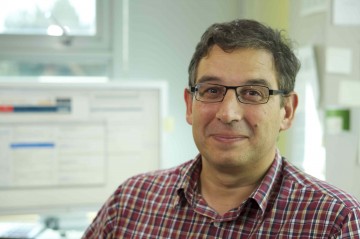Faculty of Medicine researchers, by identifying different groups of cells that alternately proliferate and diminish within a a tumour, have documented how breast cancers evade the drugs meant to destroy them.
The study, published in Nature, may lead to the development of new combination drug approaches targeting different cell populations at the same time.
“Think of it as an ecosystem,” said senior author Samuel Aparicio, a Professor in the Department of Pathology and Laboratory Medicine and Head of the BC Cancer Agency’s Department of Molecular Oncology. “It’s always evolving and changing. When they change over time, they come resistant to drugs. This is a phenomenon we have to overcome.”
The study is the most comprehensive analysis of cancer evolution in lab models. It uses a combination of genomic sequencing and a novel computational model — PyClone — developed by co-senior author Sohrab Shah, an Assistant Professor in the Department of Pathology and Laboratory Medicine, who is the Canada Research Chair in Computational Cancer Genomics.
“We now have the ability to determine which individual cancer cells are the ‘resilient’ ones, which, if left untreated, will have the most impact on patient survival,” said Dr. Shah, a scientist at the BC Cancer Agency.
The research, vital to future drug studies, proves that treating cancers is akin to shooting at a moving target. Different cell groups within a complex cancer have varying abilities to survive and grow, and this causes the composition of the cancer to change over time and in response to drug therapies. Until now, the evolution of a patient’s cancer has been largely overlooked from a treatment perspective without a way to accurately analyze and measure the changing cell populations.
With the power of genomic sequencing being integrated into patient trials at the BC Cancer Agency, this major advancement comes at a critical time, providing a model to determine a cancer’s growth trajectory.The published findings provide the global cancer community with an invaluable method to track the cell populations and mutations that dominate and emerge as the driving force of a person’s cancer, and creates a critical standard for future pre-clinical drug testing.
The research was conducted in lab models using patient-donated human breast cancer tissue samples, so-called “avatars” of human cancer. The research was carried out by lab scientists and bioinformaticians, in collaboration with the University of Cambridge.
“This is changing the way we think about drug development,” Dr. Aparicio said.
